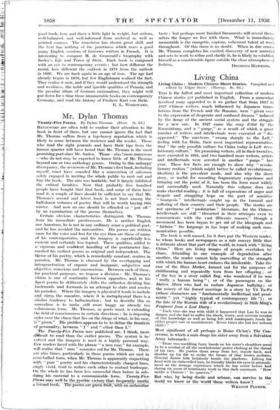Living China
THIS is the fullest and most important collection of modern Chinese stories yet published in English. From a somewhat involved essay appended to it we gather that from 1917 to 1927 Chinese writers, much influenced by Japanese trans- lations from the French and the Russian, were "given over to the expression of desperate and confused dreams" induced by the decay of the ancient -social syste'm and the struggle for a new one. In 1927 came the coup d'etat by the Kuomintang, and a "purge," as a result of which a great number of writers and intellectuals were executed or "dis- appeared." The survivors "swung sharply to the Left," feeling with Lu Hsiin, their most important representative, that "the only possible culture for China today is Left revo- lutionary culture." Six promising writers, all in their twenties, were executed in 1931, and two hundred more writers, artists and intellectuals were arrested in another " purge " last year. These few facts are enough to show why "revolu- tionary realism" (which might better be called revolutionary idealism) is the prevalent mode, and also why the short story, so useful for recording fragmentary experience and bringing out the point of it, has been the form most widely and successfully used. Naturally this volume does not make cheerful reading : it is full of expressions of anger and despair and struggling hope on the part of- sensitive " bourgeois " intellectuals caught up in the turmoil and suffering of their country and their people. The stories are not specimens_ of " proletarian_ ". literature, for the Chinese intellectuals are still "thwarted in Their attempts even to communicate with the vast illiterate masses," though a movement has been begun to get rid of the, ideograph and " latinise " the language in the hope of making such com- munication possible.
The book is well named, for it does put the Western reader, to whom books and newspapers as a rule convey little that is intimate about that part of the world, in touch with "living
China." Here- living images of people overtaken by chaos. Attendng to one example of degradation after another, the reader cannot -help marvelling at the strength with which the human heart endures the intolerable. Take the case of the Slave Mother, farmed out for the purposes of childbearing and repeatedly torn from her offspring ; or of the boy in a story called Dog, who wondered if he was "really a human being " ; or of the passengers on the Dairen Marti who 'had to endure Japanese bullying ; or the misery of the forced marriage in a story by Yii Ta-Fu (whose characters are "fundamentally ineffectual and pessi- mistic " yet "highly typical of contemporary life ") ; , or the fate bUthe Koran- Wife 'of-it
Fragment from a Lost Diary :
"Each time she was with child it happened that Lao.Li was in' danger, and she had to suffer the shock, worry, and nervous tension. of this knowledge as well as being left with inadequatn funds for either proper care or nourishment. Seven times she lost her unborn.' child! '
Most significant of all perhaps is Hsiao Ch'ien's The' Con- version, in which a Min 'drags his sister away froxii it Salvation' Army tabernacle• _
- I
, "Those two meddling furry hands on his sister's shoulder's seena to be a symbol of all the unwholesome power choking at the thrcia4 -of his race. He pushes them away from her, stands back, and doubles up his fist *to strike the 'breast of that brown uniform: General James falls helplessly* beside- the platform: Lifting bin head with its dishevelled hair, he. literally blinks his eyes In astonish-; meat ate the strange experience which- he has never, -before had during six years of missionary work in this dark continent. 'How' unlike a Chinese ! ' he qaavers.'-!-- =
/bit- who, by being docile and urbane, can survive in the world we know or the World 'these writers know ? s WILLIAM PLOMER.
















































 Previous page
Previous page